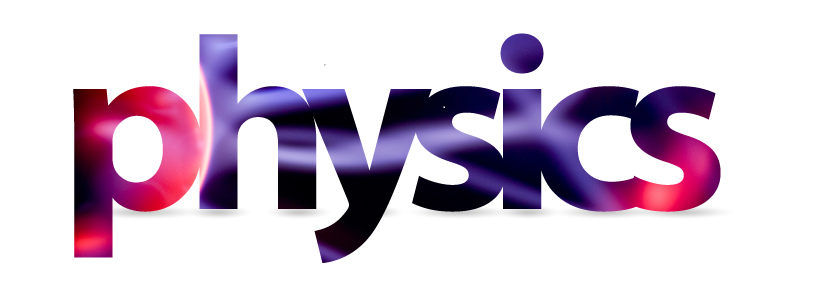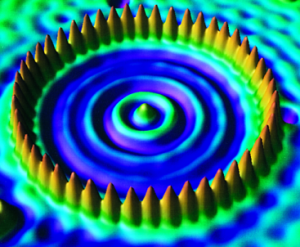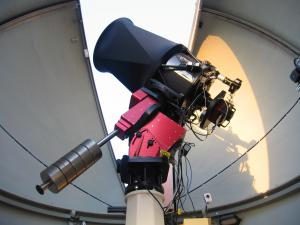Physics pathways

Discover the fascinating world of physics by studying and earning your qualification through The Open University.
Further your understanding of physics through a mixture of compulsory and optional study modules that range from classical to quantum physics, and investigate radiation and matter at small and large scales.
Our various undergraduate degree programmes: BSc Physics (R51), BSc Mathematics and Physics (Q77) and MPhys Master of Physics (M06, physics strand) allow you to study physics flexibly - full-time or part-time - at a pace to suit you and your other life commitments. (Note that the BSc Natural Sciences (Q64, physics strand) has now been effectively superseded by the BSc Physics degree, although the former is still available.)
The BSc Physics and BSc Natural Sciences qualifications include a physics pathway which is accredited by the Institute of Physics. (We are aiming for the MPhys Physics pathway to be accredited soon.) For full details and alternative combinations see the IoP document on accreditation of OU degrees (Scheme 5).

By achieving a Natural Sciences qualification with The Open University you’ll be an adaptable graduate with a range of transferable skills that are highly valued in the labour market. The logical, reasoned approach needed for science study means science graduates are well placed to enter both scientific and non-scientific jobs. As an OU student you’ll have full access to our Careers Advisory Service to support your study choices and career planning. See where your OU Natural Sciences degree could take you and how studying Science with the OU enhances your career prospects
What will I study for my Physics degree?
Here's an outline of what you might study on the various Physics pathways. (Please note that exact module titles and codes can vary as new versions are made. Check our latest Science modules for more information.)
Stage 1 physics

Your study starts with a wide-ranging introduction to highly topical areas of modern science, through which you’ll begin to acquire the practical, investigative and mathematical skills essential to your development as a scientist.
Your key introduction to studying BSc Physics; BSc Mathematics and Physics or MPhys Physics will usually be Questions in science (S111) (60 credits). Following this, Essential Mathematics 1 (MST124) (30 credits) provides a broad and enjoyable foundation for university-level mathematics needed on the path towards advanced physics modules. A further 30 credits will usually come from Physics and Space (SM123) (30 credits) or Essential mathematics 2 (MST125) (30 credits). For the BSc Physics and MPhys Physics degrees, alternative routes through Stage 1 (without studying S111) are available comprising either a "Basic maths start" (including Discovering Mathematics (MU123)) and an "Advanced start" (including the option to study the Stage 2 modules Astronomy (S284) and Planetary Science & the search for life (S283)). See the pathway graphic on the right of this page for details.
Guidance for different start options:
Standard start
The standard start gives you a broad inter-disciplinary introduction to science topics and the skills needed to study science successfully. This start is recommended if you are new to science or have some background in a science-related subject up to GCSE level (or equivalent).
Basic maths start
The basic maths start is recommended for students who need to develop their mathematical skills from below GCSE level (or equivalent).
Advanced start
The advanced start is an accelerated route which is particularly suitable if you have A levels or Scottish Higher qualifications in mathematics or physics.
Stage 2 physics

At stage 2 of the BSc Physics, and MPhys Physics your studies will focus on the physical sciences.
You start with the main physics foundation module Physics: from classical to quantum (S217) (60 credits). This wide-ranging module teaches general physics with an emphasis both on the concepts and their basic numerical description, as well as their application. The module covers classical mechanics; electric and gravitational fields and potentials; electromagnetism and relativity; waves and optics; thermal and statistical physics; quantum physics and an introduction to its applications to solids, atoms and nuclei. The module develops problem-solving skills and is supported by a variety of interactive online activities.

This is followed by two 30 credit modules that focus on experimental physics and on the mathematical concepts underpinning the advanced stage 3 physics modules.
The main activities in Remote experiments in physics and space (SXPS288) (30 credits) address topics in physics, astronomy and planetary science as diverse as the properties of electrons and the life cycle of stars. Online – from the comfort of your own home – you’ll have the opportunity to use equipment ranging from a bench-top X-ray spectrometer to an optical telescope in Tenerife. The aim is to build experience and expertise in practical investigation, including the skills of observation, hypothesising and reporting. The module ends with an exciting project related to a simulated Mars mission that develops team-working skills that are critical to collaborative scientific enquiry. SXPS288 makes use of innovative remote-access experiments hosted by the award-winning OpenScience Laboratory.

Mathematical methods (MST224) (30 credits) is designed to teach you about a variety of mathematical methods which are used in modelling through their application to solving real world problems. These methods include differential equations, linear algebra and vector calculus. You will become familiar with new mathematical skills mainly by using pencil and paper and by thinking.
If instead you follow the BSc Mathematics and Physics degree, you will study Mathematical methods, models and modelling (MST210) (60 credits) instead of SXPS288 and MST224.
Stage 3 physics
At Stage 3 you will study more advanced physics modules which draw on your understanding of the fundamental concepts of physics and on the mathematical skills you developed at Stage 2. You will begin to use more independent study skills which will culminate (for the BSc Physics) in a module in which you will carry out a research project on a topic linked to one of your Level 3 modules.

For the BSc Physics and MPhys Physics degrees, you will start with two compulsory modules: Quantum Physics and Electromagnetism.
Quantum Physics (SM380) (30 credits) surveys the physical principles, mathematical techniques and interpretation of quantum theory. The Schrödinger equation, the uncertainty principle, the exclusion principle, fermions and bosons, measurement probabilities, entanglement, perturbation theory and transition rates are all discussed. Applications include atoms, molecules, nuclei, solids, scanning tunnelling microscopy, quantum computing and quantum cryptography. The module includes use of the IBM quantum computer.

Electromagnetism (SM381) (30 credits) is concerned with the electromagnetic fields and electromagnetic radiation that pervade the world around you. It shows how the main ideas of electromagnetism can be encapsulated in the famous Maxwell’s equations. These can be used to explain the properties of light and radiowaves; the magnetic fields produced by brain activity; the way a television tube works; the transparency of the cornea in your eye; and many other phenomena. The module includes practical work using the OU's OpenSTEM Labs.
If you follow the BSc Physics route, a further 30 credits can come from a number of modules in astrophysics or applied mathematics, including Astrophysics of Stars and Exoplanets (S384) (30credits), Cosmology and the distant Universe (S385) (30 credits), Deterministic and stochastic dynamics (MS327) (30 credits), Mathematical methods and fluid mechanics (MST326) (30 credits), or Computational applied mathematics (MST374) (30 credits).
The culmination of your stage 3 BSc Physics studies is the project module Science project course: radiation and matter (SXP390) (30 credits). You’ll undertake individual investigations within defined topics in the general area of radiation and matter: quantum entanglement, bioelectromagnetism, gravitational lensing, astrophysical jets and exoplanets. There is also a physics education research topic. You’ll need access to scientific literature, probably from electronic library sources. The study materials provide a guide to planning and conducting project work; help with searching and using the literature; and writing a report, but ultimately this is a chance for you to plan and execute a piece of work for yourself.
If you follow the MPhys Physics route, you will take two maths or astrophysics/cosmology modules (2 x 30 credits) from the selection above and not SXP390.
If instead you follow the BSc Mathematics and Physics degree you will choose two mathematics modules (2 x 30 credits) to complement two physics or astrophysics/cosmology modules (2 x 30 credits) and not SXP390.
The physics pathway in BSc Physics is accredited by the Institute of Physics. See here for details.
Stage 4 physics
For the MPhys Physics pathway, there is in addition Stage 4 study, comprising a further 120 credits.
You will begin by studying Quantum and Statistical Mechanics of Matter (SM880, starting 2024) (30 credits) which will offer a taste of the research areas undertaken by OU staff.
You will then study one of the following mathematics modules: Calculus of variations and advanced calculus (M820) (30 credits) or Non-linear ordinary differential equations (M821) (30 credits).
Finally, the culmination of your MPhys study wil be the Masters level project in physical sciences (S841) (60 credits) in which you will undertake an individual research project linked to the research of OU staff.
Learning underpinned by research

The Open University doesn’t just teach: it’s a global leader in research and innovation too, with OU research and development ranking in the top third of UK universities. The Faculty of Science has a long and distinguished record of conducting high quality, internationally leading research. Our researchers also contribute to our state of the art curriculum material. Find out more about our research in Physics.
What's OU study like?

Our long established, quality distance-learning methods use innovative technologies to provide a modern, blended learning experience. We’re designing our new Science modules with on-screen delivery in mind, taking advantage of year-on-year developments in new technologies to make your studies with us even more engaging and flexible - on computer, mobile and tablet devices.
You will be immersed in interactive activities during your physics studies, using a mix of high quality text, graphics, audios and videos to support your learning.
Find out more about what it's like to study science at the Open University here.
How much will it cost?
Studying physics with The Open University is not just flexible but great value for money, whether you live at home or away. Take a look at funding in more detail
Are there any formal entry requirements?
No - most of our undergraduate courses (including Natural sciences) have no formal entry requirements.
Most people start off their science studies with our introductory module S111 Questions in science. To get the best from it you’ll need some knowledge of science concepts and mathematical skills, and the ability to read and write to a good standard of English. Our Access module is great preparation if you need it.
Can I try some study first before committing to a degree?
Absolutely. We’ve got a number of different options available:
- Our Science access module lets you try out the OU’s style of learning. You’ll get your own personal tutor and you may even be able to study for free.
- If you want to try online study without direct tutor support, have a look at our Science: online short courses.
.png)
.png)
.jpg)
